Taken at breakfast this morning in South Palm Beach:
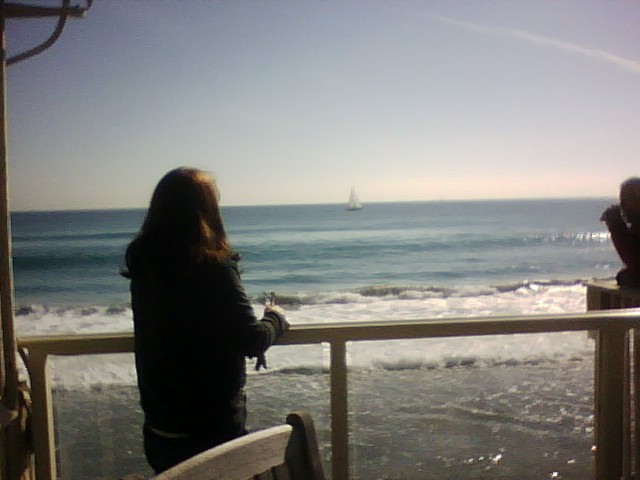
Archives for February 2010
TT: Reluctant to relocate
 I’ve been too busy to write much about it lately, but for the past few weeks Mrs. T and I have been living in Winter Park, Florida, where I’m serving as a visiting scholar-in-residence at Rollins College’s Winter Park Institute. My duties include giving public lectures, teaching a seminar in arts criticism, and popping up as often as possible in unexpected places. Last week, for instance, I sat in on a rehearsal of the splendid chorus of the Bach Festival Society of Winter Park, at which I sightread the bass part of the Mozart Requiem with rather more aplomb than my rustiness had led me to expect. I had even more fun giving a lecture about Pops: A Life of Louis Armstrong that was accompanied by a seven-piece band of local jazzmen who tore up the joint. I’ve never been happier to have a show stolen out from under me!
I’ve been too busy to write much about it lately, but for the past few weeks Mrs. T and I have been living in Winter Park, Florida, where I’m serving as a visiting scholar-in-residence at Rollins College’s Winter Park Institute. My duties include giving public lectures, teaching a seminar in arts criticism, and popping up as often as possible in unexpected places. Last week, for instance, I sat in on a rehearsal of the splendid chorus of the Bach Festival Society of Winter Park, at which I sightread the bass part of the Mozart Requiem with rather more aplomb than my rustiness had led me to expect. I had even more fun giving a lecture about Pops: A Life of Louis Armstrong that was accompanied by a seven-piece band of local jazzmen who tore up the joint. I’ve never been happier to have a show stolen out from under me!
I won’t deny that the weather here was part of the draw–they tell me it’s been snowing elsewhere in America–and so was the close proximity of Rollins College to Disney World. Mrs. T and I paid our first visit to Epcot Center last Sunday, accompanied by my brother and sister-in-law, who drove out from Smalltown, U.S.A., to spend the weekend with us. To wear short sleeves in February is no small thing for a New Yorker whose patience with cold weather is growing shorter with every passing year. But even if I had to pull on a sweater from time to time, I have no doubt that I’d still be enjoying myself. Not only is Rollins an exceedingly good school and Winter Park a beautiful town full of interesting people and excellent restaurants, but Florida, as I learned last year and rediscovered last month, is no less full of first-class theater. The only disappointing aspect of my stay here is that I’ve had to pack a bag and fly north most weekends to cover Broadway openings and peddle Pops.
All this came to pass because John Sinclair, an old college classmate of mine, is now the chairman of Rollins’ music department and the artistic director of the Bach Festival. He lured me to Winter Park last March to give a lecture, and the experience was so mutually satisfactory that John’s wife Gail, who runs the Winter Park Institute, asked if I’d like to come back the following year as a visiting scholar. I said yes in a heartbeat, not realizing that I’d still be up to my ears in Pops when January rolled around. Fortunately, we were able to reconcile most of the resulting schedule conflicts, and Mrs. T and I flew down to Florida a month ago.
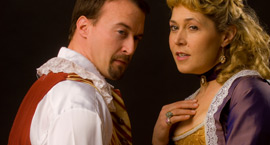 Just when the fun is starting/Comes the time for parting. My tenure at the Winter Park Institute ends this week, and on Friday I head north to Lenox, Massachusetts, where I’ll be seeing Shakespeare & Company’s production of Dangerous Liaisons. I’m looking forward to my visit to Lenox very much, but less so to the consequent change in climate, and though I know that Mrs. T and I will be glad to return in due course to our cozy little apartment on the Upper West Side of Manhattan, I also know that we’re going to miss what we’ve grown in the past few weeks to think of as our new home away from home.
Just when the fun is starting/Comes the time for parting. My tenure at the Winter Park Institute ends this week, and on Friday I head north to Lenox, Massachusetts, where I’ll be seeing Shakespeare & Company’s production of Dangerous Liaisons. I’m looking forward to my visit to Lenox very much, but less so to the consequent change in climate, and though I know that Mrs. T and I will be glad to return in due course to our cozy little apartment on the Upper West Side of Manhattan, I also know that we’re going to miss what we’ve grown in the past few weeks to think of as our new home away from home.
TT: Almanac
“Do you know, I believe we should all behave quite differently if we lived in a warm, sunny climate all the time. We shouldn’t be so withdrawn and shy and difficult.”
Noël Coward, screenplay for Brief Encounter
A TOUR OF “HELL” IN EVENING DRESS
“Before there were regional theaters, there was Charles Laughton. Today most people remember him for having played Quasimodo in The Hunchback of Notre Dame and the snarling Captain Bligh in Mutiny on the Bounty, but between 1949 and 1952 he spent much of his time not in Hollywood but on the road with Charles Boyer, Cedric Hardwicke and Agnes Moorehead. Billing themselves as the First Drama Quartette, these four middle-aged stars barnstormed from coast to coast, performing George Bernard Shaw’s Don Juan in Hell in sports arenas, banquet halls and civic auditoriums that had never before offered anything more daunting than fluffy farces like Arsenic and Old Lace…”
TT: Your town, too
Today’s Wall Street Journal drama column is a double-barrelled rave in which I praise to the skies the third and last installment of Horton Foote’s Orphans’ Home Cycle and Venus in Fur, a new play by David Ives. Here’s a excerpt.
* * *
Now that I’ve seen all three installments of “The Orphans’ Home Cycle,” Horton Foote’s dramatic portrait of a small-town Texas family, I can say with certainty what I suspected from the outset: Foote, who died last March, left behind a masterpiece, one that will rank high among the signal achievements of American theater in the 20th century. We owe it to Michael Wilson, the director of this joint production of New York’s Signature Theatre Company and Mr. Wilson’s own Hartford Stage, that the nine plays on which “The Orphans’ Home Cycle” is based, which were originally written between 1974 and 1997, are being presented as a unit at last–and that they are being performed with such sympathy and sensitivity as to make their virtues instantly manifest….
“The Orphans’ Home Cycle” is “Our Town” in macrocosm, a giant canvas on which Foote has portrayed everyday American life so knowingly that all of us can find ourselves somewhere in his great mural.
Mr. Wilson, working in the closest possible collaboration with the members of his design team, has given this production the easy flow of a movie–except that it’s far more intimate. Scene dissolves into scene so naturally that you feel less like a spectator than a member of the family, sitting at the kitchen table and watching real life run its course….
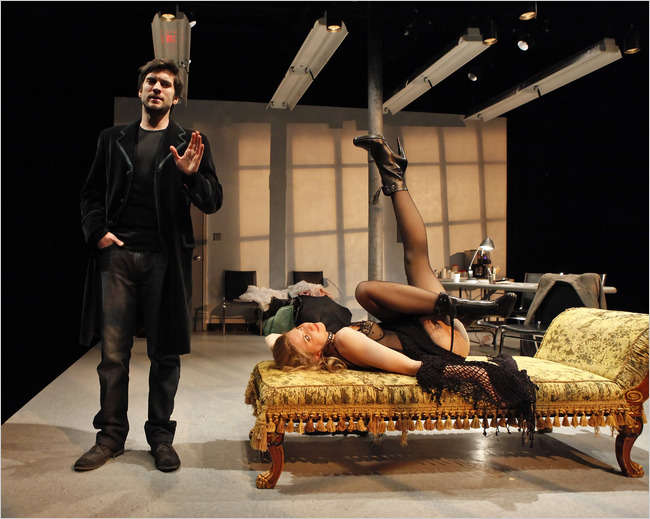 David Ives used to specialize in witty one-act comedies. In recent years, though, he’s expanded his canvas, and “Venus in Fur,” like “New Jerusalem” and “Polish Joke” before it, shows that the author of such surreal sketches as “Philip Glass Buys a Loaf of Bread” and “Variations on the Death of Trotsky” has grown into a playwright of considerable consequence–which doesn’t mean that he’s lost his sense of humor. “Venus in Fur,” a 90-minute two-hander performed on a single set, actually feels a bit like one of Mr. Ives’ one-act plays writ large, though it cuts much deeper, both intellectually and emotionally….
David Ives used to specialize in witty one-act comedies. In recent years, though, he’s expanded his canvas, and “Venus in Fur,” like “New Jerusalem” and “Polish Joke” before it, shows that the author of such surreal sketches as “Philip Glass Buys a Loaf of Bread” and “Variations on the Death of Trotsky” has grown into a playwright of considerable consequence–which doesn’t mean that he’s lost his sense of humor. “Venus in Fur,” a 90-minute two-hander performed on a single set, actually feels a bit like one of Mr. Ives’ one-act plays writ large, though it cuts much deeper, both intellectually and emotionally….
Though “Venus in Fur” is deadly serious, much of it is also madly funny, and Mr. Ives strews one-liners in every direction with prodigal generosity. Nina Arianda, who has most of the best ones, detonates them with the accuracy of an atomic clock. This is her first professional role of any consequence–she graduated from New York University last year–and I have no doubt whatsoever that we’re going to be seeing a whole lot more of her. She has star quality oozing from every pore….
* * *
Read the whole thing here.
* * *
Trailers for the first two installments of The Orphans’ Home Cycle:
TT: Captain Bligh’s good turn
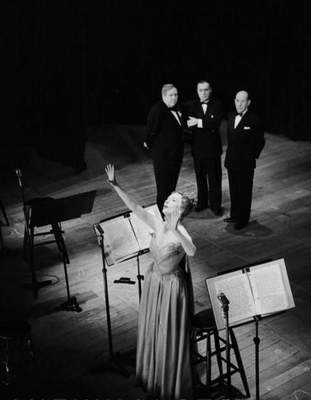 I’ve written quite a bit in recent years about what I call the “middlebrow moment,” the period in the Fifties and Sixties when the mass media–especially TV–made a concerted attempt to introduce highbrow fare to their viewers and readers, presenting it in an accessible and engaging way and operating on the assumption that ordinary people wanted to expand their cultural awareness.
I’ve written quite a bit in recent years about what I call the “middlebrow moment,” the period in the Fifties and Sixties when the mass media–especially TV–made a concerted attempt to introduce highbrow fare to their viewers and readers, presenting it in an accessible and engaging way and operating on the assumption that ordinary people wanted to expand their cultural awareness.
In tomorrow’s Wall Street Journal “Sightings” column, I take a look back at one of the most fascinating of all such ventures, the First Drama Quartette’s touring version of George Bernard Shaw’s Don Juan in Hell. This production, in which Charles Laughton, Charles Boyer, Cedric Hardwicke, and Agnes Moorehead donned evening dress and read Shaw’s play on a bare stage, played from coast to coast from 1949 to 1952. It was performed everywhere from Carnegie Hall to small-town high-school gymnasiums, and a half-million Americans came to see it. Laughton, who directed the production, made the cover of Time on the strength of the show’s success.
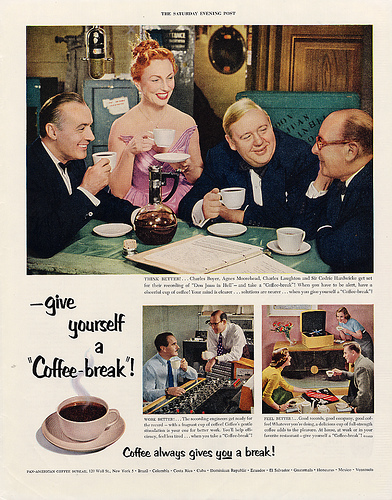 In 1952 Columbia Masterworks made a complete original-cast recording of Don Juan in Hell that was issued as a two-LP set. It went out of print four decades ago and had never been reissued in any format until Saland Publishing, an audiobook outfit, released it without fanfare as an mp3 download. (You can purchase it here.) When I ran across this reissue a couple of weeks ago while doing online research on Laughton’s career, I resolved to bring it to the attention of the general public. Hence Saturday’s column, in which I tell the story of how Laughton and Paul Gregory, his producing partner, got the idea to take Don Juan in Hell on the road–and how American audiences responded. All in all, I can’t think of a more illuminating and exemplary chapter in the story of America’s middlebrow moment.
In 1952 Columbia Masterworks made a complete original-cast recording of Don Juan in Hell that was issued as a two-LP set. It went out of print four decades ago and had never been reissued in any format until Saland Publishing, an audiobook outfit, released it without fanfare as an mp3 download. (You can purchase it here.) When I ran across this reissue a couple of weeks ago while doing online research on Laughton’s career, I resolved to bring it to the attention of the general public. Hence Saturday’s column, in which I tell the story of how Laughton and Paul Gregory, his producing partner, got the idea to take Don Juan in Hell on the road–and how American audiences responded. All in all, I can’t think of a more illuminating and exemplary chapter in the story of America’s middlebrow moment.
If you’re curious, pick up a copy of Saturday’s Journal and see what I have to say.
UPDATE: Read the whole thing here.
TT: Almanac
“And I regret to say that there were moments when my deep and loving pity for her merged into a desire to kick her fairly hard.”
Dodie Smith, I Capture the Castle
TT: So you want to see a show?
Here’s my list of recommended Broadway, off-Broadway, and out-of-town shows, updated weekly. In all cases, I gave these shows favorable reviews (if sometimes qualifiedly so) in The Wall Street Journal when they opened. For more information, click on the title.
Warning: Broadway shows marked with an asterisk were sold out, or nearly so, last week.
BROADWAY:
• Fela! * (musical, PG-13, adult subject matter, reviewed here)
• God of Carnage (serious comedy, PG-13, adult subject matter, reviewed here)
• South Pacific (musical, G/PG-13, some sexual content, brilliantly staged but unsuitable for viewers acutely allergic to preachiness, reviewed here)
• A View from the Bridge * (drama, PG-13, violence and some sexual content, closes Apr. 4, reviewed here)
OFF BROADWAY:
• Avenue Q (musical, R, adult subject matter and one show-stopping scene of puppet-on-puppet sex, reviewed here)
• The Fantasticks (musical, G, suitable for children capable of enjoying a love story, reviewed here)
• The Orphans’ Home Cycle, Parts 1 and 2 (drama, G/PG-13, too complicated for children, now being performed in rotating repertory with third part of cycle, extended through May 8, reviewed here and here)
• Our Town (drama, G, suitable for mature children, reviewed here)
CLOSING SOON OFF BROADWAY:
• Ernest in Love (musical, G, a bit too complicated for children, closes Feb. 14, reviewed here)
CLOSING SOON IN CHICAGO, ILL.:
• American Buffalo (drama, PG-13/R, violence and very strong language, closes Feb. 14, reviewed here)
CLOSING SOON IN SARASOTA, FLA.:
• Life of Galileo (drama, G, accessible to well-read older teenagers, closes Feb. 17, reviewed here)
